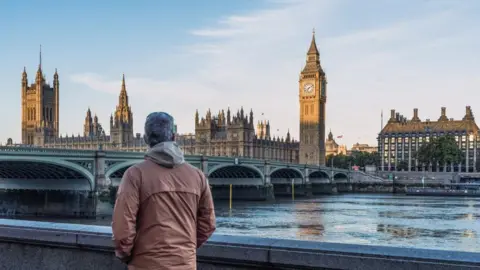The UK government’s borrowing has reached unprecedented levels in the year to March, significantly exceeding initial forecasts due primarily to substantial increases in spending on public sector pay and benefits. Official figures released today by the Office for National Statistics (ONS) show a total borrowing of £151.9 billion – a staggering £20.7 billion over the previously predicted figure of £137.3 billion. This represents a significant strain on national finances, pushing debt levels to concerning heights.
The increase in borrowing reflects a wider economic picture impacted by persistent inflation and rising interest rates. Grant Fitzner, chief economist at the ONS, explained that despite a ‘substantial boost in income’ from taxation, government expenditure rose more sharply due to inflation-related cost increases, specifically encompassing substantial rises in pay and benefit payments. By the end of the financial year, UK debt remained perilously close to the annual value of the economy’s output – a level not seen since the early 1960s.
The figures come amidst ongoing concerns about the UK’s economic outlook. The International Monetary Fund (IMF) recently downgraded its forecast for UK growth in 2025, citing the impact of global tariffs imposed by the United States under former President Donald Trump. These tariffs, designed to bolster American manufacturing and employment, have created trade barriers and contributed to a more uncertain global trading environment. The UK is particularly vulnerable due to its reliance on exports.
The IMF’s revised forecast suggests that further interest rate increases and sustained inflation could hinder economic growth significantly. Chancellor of the Exchequer Rachel Reeves is currently attending the annual meetings of the IMF and World Bank in Washington D.C., where she aims to advocate for a US trade deal and address these global economic challenges. However, pressure is mounting on her to tackle rising debt levels.
Economists are increasingly suggesting that further fiscal adjustments – potentially including spending cuts or tax increases – may be necessary to adhere to the government’s self-imposed borrowing targets. Deputy Chief UK Economist at Capital Economics, Ruth Gregory, indicated that Chancellor Reeves could face a difficult decision regarding future budgetary policy, possibly requiring additional revenue generation through either reduced spending or increased taxation.
The Treasury Secretary, Darren Jones, emphasized the government’s commitment to responsible fiscal management, stating that borrowing rules are ‘non-negotiable’ and that they were scrutinizing every penny of taxpayer expenditure for the first time in 17 years to identify and eliminate wasteful spending. Shadow Chancellor Mel Stride described the figures as ‘alarming but not surprising,’ highlighting what he perceived as the consequences of current government policy choices. March alone saw borrowing reach a record £16.4 billion, marking the third-highest monthly figure since records began in 1993, with debt interest payments rising by £1.3 billion to £4.3 billion.

